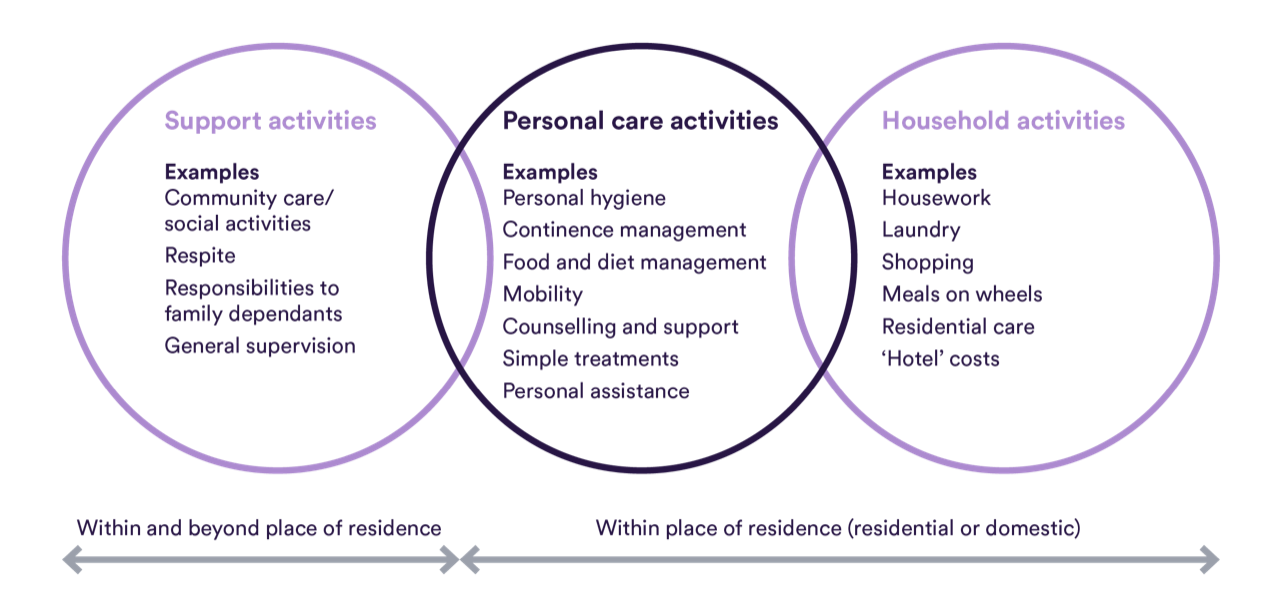Key points
- All of the countries operate a means and needs test to determine access to social care support from the local authority or health and social care trust. England is the least generous country in its offer, as Wales, Scotland and Northern Ireland offer additional support outside of the means test.
- The number of state-funded individuals varies considerably across the countries, with the greatest differences arising for these over 65. The high number of over-65s accessing state-funded care in Scotland is likely a consequence of their free personal care policy.
- Across each country, there is a drive to promote the use of personal budgets (or self-directed support) to push greater personalisation in social care.
- Determining which services are included in the offer (for example, in free personal care in Scotland) has proven a challenge in all of the other countries.
How generous are the different countries’ systems?
|
|
||||
|
Delivery mechanism name |
Care and support plans with personal budgets |
Care and support plans
|
Self-directed support
|
Self-directed support1 with personal budgets
|
|
Means test: Upper threshold Lower threshold |
£23,250 £14,250
|
£50,000* |
£29,750 £18,500 |
£23,250 £14,250 |
|
Formal additional support |
N/A |
Cap on non-residential care costs: £100/week |
Free personal and nursing care for all adults2 with eligible need
|
Free domiciliary care |
* N.B. upper threshold in Wales applies only in residential care.
England
The rate of people accessing state-funded adult social care services in England is 504 per 100,000 and 1,840 per 100,000 for short-term support to maximise independence and long-term support respectively (see above chart). Short-term support to maximise independence includes all episodes of time-limited support that are intended to maximise independence of the recipient and reduce the need for ongoing support. Long-term support is ongoing help that can be provided in a nursing or residential home, day services and community services. Community services here refer to support for those living independently (including those in sheltered housing).3
Access to state-funded care remains determined both by a means test and a needs test. These are both carried out by a person’s local authority, and were revised under the Care Act (2014), which is enshrined in ‘person-focused’ principles. In 2021, the People at the Heart of Care adult social care reform white paper outlined intentions to increase the number of people accessing state-funded support through a more generous means test and a cap on lifetime care costs, but this has since been delayed until 2025.
Any individual deemed to have some need for care is entitled to an assessment by their local authority, regardless of whether they are financially eligible.4 National eligibility criteria for need were set out under the Care and Support (Eligibility Criteria) Regulations 2014 around a person’s ability to achieve their desired outcomes in relation to their wellbeing.5 There are three conditions that must all be met for an adult to be considered to have an eligible need:
- They have a need arising from a physical or mental impairment or illness
- They are unable to achieve two or more outcomes as listed in the Care Act
- Being unable to achieve these outcomes is likely to have an impact on the individual’s wellbeing (as defined in the Care Act).
For those meeting the needs assessment threshold, the second part of the eligibility process involves a means test.
- For anyone of any age with means (which includes income, assets and savings) in excess of £23,250, there is no state support available for care, and costs fall entirely on the individual. These represent the majority of social care users in England.6
- Anyone with assets between £14,250 and £23,250 may be able to access some funding, depending on level of need.
- Anyone with assets below £14,250 is able to access full funding, depending on level of need, but may nonetheless have to contribute from their income where a care package doesn’t fully meet a person’s wants or needs (e.g. top ups for care homes).
- A person with more means than the upper threshold of £23,250 can ask their local authority to arrange support for them, but the local authority has no requirement to do so.
Any person meeting both the needs and means tests must be provided with a person-led care and support plan by the local authority. This includes a personal budget – an estimate of the total care costs that the local authority will fund, which can be delivered as follows7:
- A direct payment to the service user
- Service paid for and provided by the local authority
- Funding from the local authority to the provider of choice
- A mix of all these options.
If a person does not meet the needs or financial threshold, local authorities are required to provide information and advice to the individual.
Proposed charging reforms to adult social care have been delayed until 2025. These included the introduction of a cap set at £86,000 on the amount anyone would spend on personal care over the course of their lifetime, an increase in the lower means test threshold to £20,000, and an increase to the upper means test threshold to £100,000.
Wales
We do not have the most recent figures on the total number of people accessing state-funded social care in Wales – the most recent data is from 2018/19 and presented in the chart above. 1,011 per 100,000 people receive care either from nursing, residential or day centre services, and 1,133 per 100,000 people receive domiciliary care.
Access to state-organised and funded care is determined both by a means test and a needs test. These are both carried out by a person’s local authority and were revised under the Social Services and Wellbeing (Wales) Act 2014, which is enshrined in ‘co-production principles’ among others. Any individual deemed to have some need for care is entitled to an assessment by their local authority, regardless of whether they are financially eligible.8
The implementation of the Act has been evaluated, and evidence suggests that the legislation has encouraged change and advanced local authority relationships with health, voluntary and independent sectors.910
National eligibility criteria were set out under the Care and Support (Eligibility) (Wales) Regulations 2015, but it is recognised in statutory guidance that the “pattern of service delivery will vary from authority to authority”.11 As the Social Services and Wellbeing Act is a “people act”, eligibility conditions apply to adults, children and their carers. There are four conditions to be met, which are:
- The person’s needs arise from circumstances in the eligibility regulations, for example around physical or mental ill health
- The needs of the person relate to one or more of those listed in the Act
- The person is unable to meet that need alone (regardless of whether they are receiving help from a carer or the community)
- The person is unlikely to achieve one or more of their personal outcomes without support from the local authority.
If a person does not meet the needs threshold, local authorities are required to provide information and advice to the individual.
Any person meeting the needs threshold must be provided with a care and support plan, that should be developed in partnership with them, which reports the outcomes, actions and needs identified and the resources that will be given to support these. Care and support plans also include details of the needs (some or all) to be met with direct payments, and how frequently these will be paid out. It is compulsory for local authorities to offer direct payments to older people who meet the necessary criteria.12
For those meeting the needs threshold, the second part of the eligibility process involves a means test. The process is different depending on the setting where care is delivered.13 In residential care, the process is as follows:
- For anyone of any age with means (which includes income, assets and savings, including the value of their home) in excess of £50,000, there is no state support and nearly all costs of care fall entirely on the individual.14 A person with more means than the threshold of £50,000 can require the local authority to arrange support for them, and the local authority has a duty to do so.
- Anyone with assets below £50,000 will be able to access full funding support from the state, the level of which is set out in the care and support plan.15 The raised threshold was announced in April 2019, from £40,00016, meaning more people are now entitled to state support. Local authorities have discretion to disregard some sources of income as long as this is applied consistently within their jurisdiction. Individuals receiving state funding may nonetheless have to contribute from their income.
- There is no cap on costs in residential care.
Non-residential care costs (i.e. costs within an individual’s home and the community) are capped at a national maximum of £100 per week for all individuals, regardless of their means and how much care and support services they receive. Local authorities have discretion to provide these services for free, but none do so currently.17 Local authorities can also choose to operate a lower cap, meaning individuals receiving non-residential services would pay less for their care.
The Interministerial Group on Paying for Social Care was re-established in 2021 to review options for widening access to social care.18 Previous work from the group has considered options including making personal care at home free, removing charges for all non-residential care, and introducing a fixed weekly cost towards residential care.19
Estimates of the proportions of self-funders in Wales suggest these are much lower than in England, both in residential/nursing and domiciliary care (especially in the domiciliary care sector). Approximately 32% of people receiving residential or nursing care in Wales self-fund, while in domiciliary care this proportion is around 21% 20(see ‘How much care does each country fund?’).
More details about the inequalities in access to services between local authority-funded individuals and self-funders will be explained in an upcoming explainer on what the provider market looks like across the four UK countries.
Scotland
This chart presents the number of clients accessing state-funded care in Scotland. 1,032 per 100,000 people receive care home support, and 1,528 per 100,000 receive domiciliary support in Scotland.
Local authorities are currently responsible for the assessment of a person’s eligibility for social care under the National Eligibility Criteria – eligibility was previously regional. These were developed between the Scottish government and the Convention of Scottish Local Authorities in 2009.21 The eligibility assessment follows a two-stage process: assessing a person’s needs and personal outcomes22, and assessing whether achieving these outcomes require services to be put in place. The National Eligibility Framework sets out four levels of need: critical, substantial, moderate or low risk. Local authorities have discretion to set the level of need at which services are delivered.23
Any person meeting the needs threshold must be provided with a self-directed support plan24, which provides an estimate of the total care costs the local authority will fund.25 It can be delivered as follows26:
- A direct payment to the service user
- Service paid for and provided by the local authority
- Funding from the local authority to the provider of choice
- A mix of all these options.
If a person’s self-directed support plan requires personal care, this is provided for free to all adults by the local authority, and must be provided to individuals with a critical or substantial level of need within six weeks of the assessment outcome.27 Personal care includes personal hygiene, continence management, food and diet management, assistance with mobility, counselling and support, simple treatments, and personal assistance.28
Individuals requiring personal care to be delivered within a care home setting receive a weekly payment of £212.8529 directly from the local authority to the care home to cover the costs of this care.30 Until April 2019, personal care was only free to the over-65s – this has now been extended to all adults after an extensive campaign.31
For social care needs identified in the self-directed support plan that fall outside of personal and nursing care, a means test is applied32:
- For anyone of any age with means (which includes income, assets and savings) in excess of £29,750, there is no state support for social care activities that fall outside of personal and nursing care.
- Anyone with assets between £18,500 and £29,750 may be able to access some funding, depending on level of need.
- Anyone with assets below £18,500 are able to access full funding, depending on level of need, but may nonetheless have to make some contribution from their income.
33 (See ‘How much care does each country fund? ’).
More details about how self-funders and local authority-funded individuals experience different access to services will be discussed further in an upcoming explainer in the series on the provider market.
Northern Ireland
In Northern Ireland, there are many more people receiving domiciliary care than those who receive care home support, as shown above. This may be due to the fact that domiciliary care is essentially free. 1,560 per 100,000 people access domiciliary care, compared to 1,011 per 100,000 who receive a care package for nursing and residential accommodation.
Access to state-funded care is determined both by a means test and a needs test. Any person in need of care and support is entitled to a health and social care needs assessment (under the Northern Ireland Single Assessment Tool) by their health and social care trust 34 regardless of their financial eligibility. The assessment covers both health and social care needs due to the integrated nature of the system.35 This is undertaken by all practitioners involved in the care of an individual.36
For individuals who are assessed as having a predominantly social care need (as opposed to a health predominant need – see our upcoming explainer on other types of support) the second part of the eligibility process involves a means test37:
- For anyone of any age with means (includes income, assets and savings) in excess of £23,250, there is no state support available for care and costs fall entirely on the individual.
- Anyone with assets (as above) between £14,250 and £23,250 may be able to access some funding, depending on level of need.
- Anyone with assets (as above) below £14,250 are able to access full funding, depending on level of need, but will nonetheless have to contribute from their income.
Any person meeting the needs test and the means test must be provided with a self-directed support plan, which is being rolled out across trusts in a phased approach.38 This includes a personal budget that estimates the total cost of social care activities to meet ‘individual outcomes’, and can be delivered as follows:
- A direct payment to the service user39
- A managed budget held by the trust but controlled by the service user
- Support organised by the trust
- A mix of all these options.
All individuals who qualify for social care support in the home are entitled to free domiciliary care40 41, which covers most personal care and domestic services42 except usually meals on wheels.43 It is widely understood that health and social care trusts have the power to charge for domiciliary care but normally choose not to do so.44 Stakeholders in Northern Ireland suggest this is unlikely to change in the near future. Although the service is provided for free, most recent data on domiciliary care provision45 highlighted that over 30% of domiciliary care visits lasted 15 minutes or less, and over 43% of service users received a visit lasting 15 minutes or less.
Suggested citation
Dodsworth E and Oung C (2023) 'Offer and eligibility: Who can access state-funded adult care and what are people entitled to?', in Adult social care in the four countries of the UK. Explainer series, Nuffield Trust.



Adult social care in the four countries of the UK
Comment series